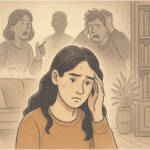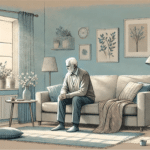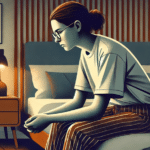Key Takeaways
- Living alone with schizoaffective disorder can increase the risks of anxiety and depression—especially during significant life changes such as divorce or widowhood.
- Even though there are some risks involved, research shows that high-quality social interactions can help to protect your mental health if you live alone.
- Loneliness can really slow down recovery from schizoaffective disorder.
- A Mission for Michael (AMFM) helps people with schizoaffective disorder, offering a mix of psychotherapy, education, and medication management in a supportive setting.
Living Alone with Schizoaffective Disorder
Living alone with schizoaffective disorder has been strongly associated with increased psychiatric morbidity, including anxiety and depression.
A large-scale study involving over 121,000 participants found that participants who lived alone had a higher prevalence of psychiatric morbidity—with a 1.608, 95% odds ratio. The impact was particularly severe for individuals experiencing life transitions, such as divorce or widowhood, indicating that isolation during these vulnerable periods can exacerbate mental health issues.
Social Satisfaction as a Protective Factor
Despite the risks, living alone can serve as a protective factor for individuals recovering from psychosis. Research has shown that social satisfaction—defined by the quality rather than quantity of social interactions—is the strongest predictor of mental health improvement. Meaningful connections can mitigate the adverse effects of solitude for a greater sense of well-being and recovery.
Loneliness and Its Impact on Recovery
Loneliness remains a prevalent challenge for individuals with schizoaffective disorder. An integrative review identified contributing factors such as unemployment, financial strain, and societal stigma. These issues increase feelings of isolation and hinder recovery outcomes.
Implications for Mental Health Practice
- Addressing Social Isolation: Interventions in loneliness and the development of meaningful social networks are required.
- Improving Social Satisfaction: Programs that emphasize the quality of social contact could considerably improve the outcomes of mental health.
- Holistic Support Services: Mental health services should be integrated into the physical health and social support services as part of the whole recovery process.
Founded in 2010, A Mission For Michael (AMFM) offers specialized mental health care across California, Minnesota, and Virginia. Our accredited facilities provide residential and outpatient programs, utilizing evidence-based therapies such as CBT, DBT, and EMDR.
Our dedicated team of licensed professionals ensures every client receives the best care possible, supported by accreditation from The Joint Commission. We are committed to safety and personalized treatment plans.
Daily Coping Techniques
| Technique | Description | Purpose |
| Establishing Routine | Create a routine incorporating specific times for rising, meals, and activities to place structure in your life, and reduce stress. | Creates structure and predictability, reducing stress and managing symptoms. |
| Mindfulness Practices | Breathe deeply, meditate or do yoga. | This lowers stress, improves self-awareness, and supports emotional regulation. |
| Monitoring Mental Health | Maintain a journal to document daily experiences and emotional reactions. Use mental health apps to monitor patterns and trends. | Helps recognize mood shifts and behavioral changes to make symptom management easier. |
| Planned Meals and Activities | Eat a balanced diet and incorporate necessary nutrition and exercise into daily routines. | Supports overall physical health and mental well-being. |
| Scheduled Relaxation | Allocate time for hobbies and relaxation activities. | Promotes mental well-being and reduces feelings of being overwhelmed. |
Alternatives to Living Alone

Shared Living Options
For people with schizoaffective disorder, shared living is a good option because it gives them independence and support. You can live with family or in a group home.
You’ll have help with daily tasks and the necessary support during crises or when symptoms get worse. Plus, being around other people makes us feel safer.
Make sure your housemates understand your mental health needs. Open communication about boundaries and expectations is key to a supportive home.
Assisted Living
Assisted living is for you if you want to be independent but need help with your symptoms.
Assisted living facilities are a secure environment designed for the needs of individuals who may not be able to live completely independently but still value some autonomy.
Evaluating the Decision to Live Alone
The first thing to consider is whether you’re ready for this on a personal level. Look at your ability to manage your medication, stick to a routine, and handle emergencies on your own. It’s also worth thinking about the strength and reliability of your support network. Having a solid circle of family and friends is really important for managing life alone successfully.
You can reach out to mental health professionals who can assess your readiness for living independently and offer advice based on a deep understanding of your condition. They can also put you in touch with the right people and support services, whatever your living situation.
Why Choose A Mission for Michael for Your Schizoaffective Disorder Treatment?

At A Mission for Michael (AMFM), we provide personalized treatment plans, addressing psychiatric evaluations, medication management, and therapeutic recovery. We understand that schizoaffective disorder requires more than just standard treatment, and as such, we offer counseling and therapy options, including individual psychotherapy, cognitive-behavioral therapy (CBT), and family therapy. These are complemented by holistic treatments and psychotropic medications for a well-rounded approach to care.
We also recognize the value of education for patients and their families, and are committed to providing comprehensive information about schizoaffective symptoms and effective management strategies.
Choosing A Mission for Michael means choosing a partner who is committed to your mental health journey. We will help you verify insurance coverage so you can be admitted as soon as possible.
Frequently Asked Questions (FAQ)
Is it safe for someone with schizoaffective disorder to live alone?
Living alone with schizoaffective disorder can increase psychiatric risks such as anxiety and depression—especially during significant life transitions like divorce or widowhood. But, with the right support systems and coping strategies, individuals can manage these risks effectively.
How can social satisfaction protect against the challenges of living alone?
Social satisfaction, defined by the quality of social interactions rather than quantity, can help mitigate the adverse effects of solitude.
What are the impacts of loneliness on recovery from schizoaffective disorder?
Loneliness can significantly hinder recovery, with factors such as unemployment, financial strain, and societal stigma exacerbating feelings of isolation.
What daily coping techniques are recommended for someone with schizoaffective disorder living alone?
Daily coping routines for individuals with schizoaffective disorder include establishing routines, practicing mindfulness, monitoring mental health, planning meals and activities, and scheduling relaxation periods.
What alternatives are there to living alone for someone with schizoaffective disorder?
Alternatives to living alone include shared living arrangements, with friends or family, and assisted living facilities.
Why choose A Mission for Michael for your schizoaffective disorder treatment?
At A Mission for Michael (AMFM), we offer personalized treatment plans with a holistic approach, offering both psychoeducation and psychotropic medications in a supportive setting.












